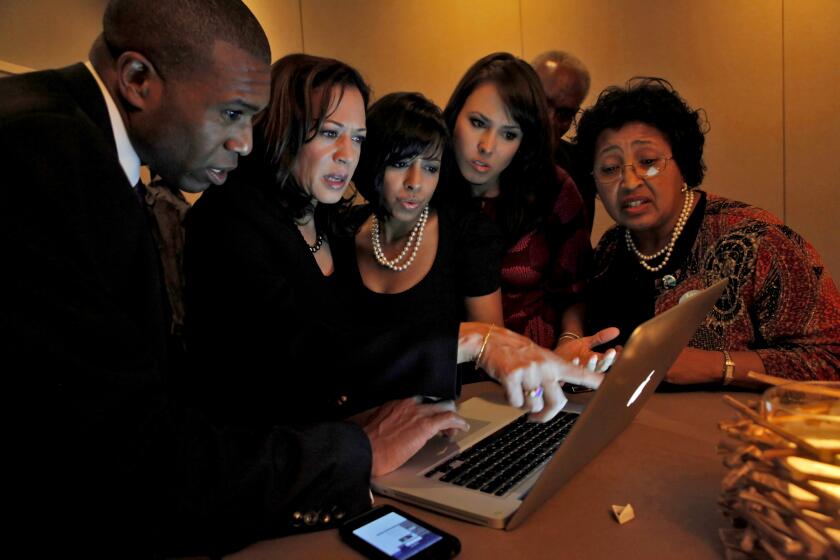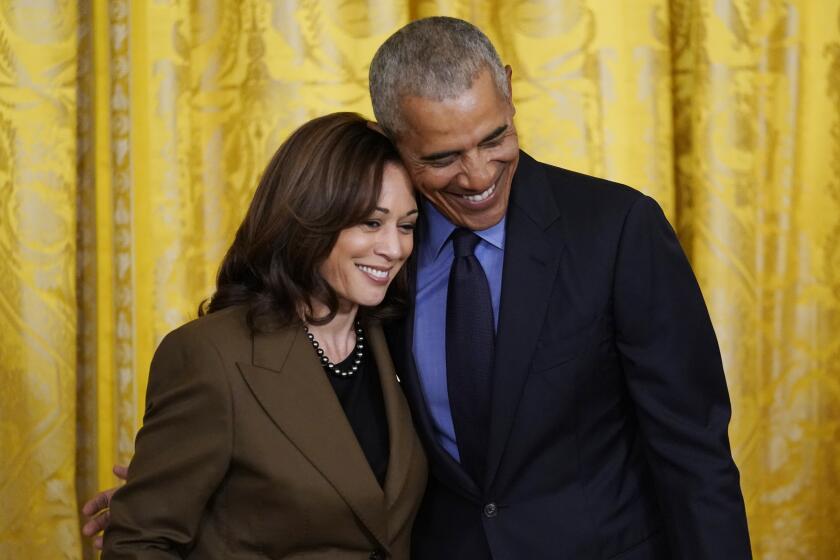Barbara Boxer--She’s Not One to Pull Her Punches : Politics: Congresswoman campaigns for Democratic Senate nomination with energy, passion and optimism.
One day Barbara Boxer is in a Beverly Hills back yard suggesting to smartly dressed professional women that the best way to help the rapidly disintegrating Soviet Union is not by sending food or money, but by serving as an example of democracy at its best.
Another day, Boxer is in a Susanville cafe rapping with conservative leaders of rural Lassen County as if she were a regular at the boys’ morning coffee gathering. “They call you an isolationist,” challenges one man, who is seated beneath the blank stare of mounted deer heads. Boxer shoots back: “But I’m not at all.”
Then Boxer is back in Washington, pushing the U.S. House of Representatives to require that railroads fix safety violations within 30 days. That’s only fair, she argues. Any California driver would have to do the same with a bad brake light.
If energy, passion and optimism could win elections, U.S. Rep. Barbara Boxer of Marin County already would be the front-runner for the six-year U.S. Senate seat at stake in California’s 1992 elections.
Since last December, the 50-year-old Boxer has been stumping California with a mixture of traditional Democratic liberalism and her own “common-sense” populism. She is taking on the status quo and powerful institutions and challenging listless voters to get with it or lose their basic freedoms.
Even after five terms in the U.S. House, Boxer seems tireless, like the little toy rabbit with the drum in the battery advertisement on television: always on the go, tapping out her message. Her statements stream out nonstop, forming perfect 10-second sound bites--a knack developed during a brief radio career that included a show called “Marin in a Minute”:
* To Republicans who said it would embarrass the United States to shrink from fighting Saddam Hussein: “It’s not about egg on our face, it’s about blood on our kids.”
* In demanding that Germany and Japan finance their own defense: “It’s time to be Uncle Sam again and not Uncle Sucker.”
* On President Bush’s veto of her bill to pay for abortions for poor women: “It was the Boxer bill on rape and incest that said you can’t talk about Willie Horton and then force somebody to have his baby.”
Now Boxer is giving up a promising House career for a larger platform, a run for the Senate seat held since 1969 by Democrat Alan Cranston. Her most likely opponents for the Democratic nomination are Lt. Gov. Leo T. McCarthy of San Francisco and Rep. Mel Levine of Los Angeles.
Boxer has acknowledged it is a long-shot campaign against the better-known McCarthy, who has run one losing race for the Senate, and Levine, who is better financed and has a voting record in Congress that is almost the mirror image of hers. But Boxer is convinced that an activist grass-roots campaign and fund-raising effort will give her the support and exposure needed to win.
Boxer’s U.S. House record generally is that of a classic liberal Democrat. She prefers to describe herself as a fighter for people and their rights.
“I’m a fighter. That’s been me all along, standing up to whoever is in the way of what I consider to be right for the public,” she said in an interview.
“Yeah, I have an ideology. But I’m not an ideologue. It depends on the issue. To protect the environment so that we protect the health and safety? I don’t know what ideology that is. It could be liberal. It could be conservative. It could be neither.”
A respected source, “The Almanac of American Politics,” says that while her political positions seem to be compatible with those of her upscale home county--Northern California’s equivalent of Malibu and Pacific Palisades--they may be out of sync with the rest of the country. Her vote against the war in Iraq is cited by almanac authors Michael Barone and Grant Ujufusa.
“But Boxer’s persistence in her views, even in politically difficult times, is one of the things that makes her Senate candidacy, announced in December, 1990, politically workable,” they added.
Boxer’s friends also note that she always has done well in working-class areas of her district, like Vallejo. They argue that her populist-sounding message and record may appeal to disaffected middle-class Democrats and independents in Southern California.
One example comes out of the defense spending scandals of the 1980s. Boxer teamed with Republican Sen. Charles E. Grassley of Iowa and others--including Levine--in sponsoring legislation to reform some of the the military procurement practices that led to $7,622 cargo plane coffeepots and $640 toilet seats bought without competitive bids.
Industry officials claim such reforms were misdirected and shortsighted, getting lots of media attention while having little real effect. But Liz Galtney, director of the nonprofit Washington-based Project on Military Procurement, said Boxer was one of the few members of Congress who did more than just talk about reform.
“She really did do the substance,” Galtney said. “There’s no question she deserves a ton of credit for that. And she’s been very key in helping to protect the whistle-blowers in bringing these things to light.”
Boxer has been called feisty, scrappy and tenacious. After 26 years in California, there still is a bit of prove-it-to-me Brooklyn kid in her. But she does not come across as hard or brittle, as candidates with those characteristics sometimes do. During the interview, her voice softened with emotion when asked to talk about her late father, the son of Russian immigrants who went to night school to become a lawyer and accountant. She often cites his life as an example of the American dream that now eludes too many.
“He’s still very much . . . well, we were very close,” she said quietly.
Boxer mixes naturally with crowds. During a visit to a senior citizens center in Susanville, Boxer grasped hands and hugged strangers without any sign of pretense or affectation. At a recent Democratic Party picnic in Alhambra, she noticed the brutal sun was shining in the eyes of the audience. So Boxer had all of the people move onto the stage so the sun was at their backs.
One reason she is effective in Congress, associates said, is an ability to challenge people in a way that does not cause resentment.
Still, critics deride Boxer for her flamboyance and theatrics, such as her use of props like the cargo plane coffeepot and toilet seat. Ultimately, she said, it’s results that count.
“Fixing the Bradley fighting vehicle, really fixing things, making things work better. . . . And I think things are really getting better on that score now. We’re not out of the woods yet, but I think I played a role in turning things around for the better,” she said.
Boxer said the ability to rally coalitions, and her staying power, evolved from her underdog experience as a minority member of the Marin County Board of Supervisors in the late 1970s. That was a time when she constantly was on the short end of 3-2 or 4-1 votes.
“I found the way you do it is to take your issues outside, tell the people about the issues, to express it the way you think you need to express it with the passion you feel. And then pretty soon you’re going to have more allies who are going to see it that way. You get the argument out and pretty soon you build support.
“And that has been my style ever since, really, of governing, which is to take an issue out there and build support for it. Not do it all yourself. You have to get allies to do it.”
That style propelled her into a leadership position this year as chair of the House Government Operations subcommittee on government activities and transportation. She specialized in human resources and AIDS issues during a term on the House Budget Committee. She has been a member of the Armed Services Committee and chairwoman of Congress’ military reform caucus.
So why give up a secure House career for a chancy run for the Senate?
To answer, Boxer recalls the event that transformed her from a sometime stockbroker, Marin housewife and mother to political activist. In 1968, distressed by the Robert F. Kennedy and Martin Luther King Jr. assassinations and the war in Vietnam, Boxer called some friends together in her Greenbrae back yard--the house where she still lives--and asked them, “Are you feeling what I’m feeling?”
“I wanted to do something and didn’t know what,” Boxer said. “I don’t know how it all happened, but what we decided was the politics of the world was too large for us. So what we would do was try to do something in the community that would help some people.”
They formed a volunteer program known as the Education Corps of Marin to equip and train high school dropouts to deal with adult life and get jobs. The program was so successful, Boxer said, it was taken over by the Marin school system.
“It was a pretty wonderful thing,” Boxer said. “It was the first time I ever realized I had (a) ideas and (b) the ability to organize people and lead.”
In aiming for the Senate in 1991, she said, “I feel like I did that day that I called everyone into the back yard and I said, ‘Something’s wrong.’
“We’ve got to do something different here. That’s how I feel. I want to change where we are headed because I don’t think we’re headed in a good direction vis-a-vis our economy, our children, our future, our environment, our freedoms. So I’m willing to risk it all to do this because I could do so much more in the Senate.”
Boxer’s big challenge is to become known in Southern California and to expand her fund-raising base. Boxer had raised more than $1 million by July 1, but Levine had $3 million in the bank. The most recent statewide poll showed Boxer running close behind McCarthy, who had the greatest name recognition, and well ahead of Levine.
Clint Reilly, a San Francisco political consultant who has worked for Boxer in the past, said he believes Boxer’s strategy is to appeal to Democrats as the best environmentalist, the best peace candidate and the best feminist in the race.
Reilly said Boxer’s weak point is she would rather be organizing or campaigning than raising money. But an effective appeal to women could be a bonus for Boxer because they outnumber men by 750,000 among registered Democrats, he said.
“She is a relentless campaigner,” Reilly added. “She has got tremendous internal resources.”
Boxer also seems to be comfortable in taking her message anywhere in California. Alturas, in California’s northeast corner, is as about as far from Beverly Hills as you can get in California--geographically or philosophically. But Boxer’s pitch to the all-male Rotary Club in Alturas this summer was the same, no punches pulled.
The conservative Rotarians listened intently, and some seemed to nod in agreement, as Boxer attacked the Bush Administration order to prohibit doctors in federally aided facilities from counseling women about abortion.
“This isn’t about abortion,” she said. “This is about freedom of speech. It’s about telling a physician, who takes the Hippocratic oath, that he or she cannot tell the truth to a patient. Now there is something in my mind very un-American about this. . . .
“That frightens me because I don’t want the government teaching its values, its ideas to my children.”
Another major campaign theme is the need to reduce and redirect defense spending. After more than 40 years, she says, Japan and Germany should take responsibility for the defense of their own regions. Her proposal is to apply half the savings to the federal debt and the other half to beef up neglected domestic programs.
At a meeting of Democratic women at a modest home in Carson one Saturday, Boxer said: “Under the NATO umbrella, we’re spending $190 million to defend Norway. Did you know Norway was in trouble? I didn’t think so either. I think they’re doing very well, thank you very much.
“But the fact is that’s where the money is and we just need the guts to stand up and say it’s a new time--bring it home now,” Boxer added.
She also talks about her efforts to bar any further oil drilling off the California coast, to make the federal bureaucracy more responsive on issues like railroad safety and to give Americans better health care and education. No one should vote for her just because she is a woman, Boxer says. Still, she champions feminist themes, including the need to enhance female representation in the Senate. As a girl in the 1950s, Boxer remembers how her mother was inspired by the presence of just a single woman, Maine’s Margaret Chase Smith, in the Senate.
“Now we’re 40 years later and there are two women,” Boxer said. “The only way to put that in optimistic terms is to say it is a 100% increase.” At that rate, “our children’s children’s children’s children would be fossils” before women made up half the 100-member Senate, as they do the population, she said.
“There’s really something wrong with a democracy that doesn’t represent more than half its population,” Boxer said at the Beverly Hills event. “Just remember when George Bush calls his advisers into the back rooms of the White House, they all look like him.” So do the Senate and House leaderships, she added.
“We’ve got to break through that even if it means nothing more than getting a different perspective on the table. I think it’s important to democracy.”
Profile: Barbara Boxer
Boxer is a candidate for the Democratic nomination for a six-year term in the U.S. Senate from California, seeking the seat now held by Sen. Alan Cranston.
* Born: Nov. 11, 1940, Brooklyn, N.Y.
* Hometown: Greenbrae, Marin County
* Education: B.A. in economics, Brooklyn College, 1962
* Career highlights: District Congressional aide, 1974-76; Marin County supervisor, 1972-82; member, U.S. House of Representatives from California’s 6th Congressional District, 1983-present.
* Family: Husband, Stewart, a lawyer; two children.
More to Read
Get the L.A. Times Politics newsletter
Deeply reported insights into legislation, politics and policy from Sacramento, Washington and beyond. In your inbox three times per week.
You may occasionally receive promotional content from the Los Angeles Times.






